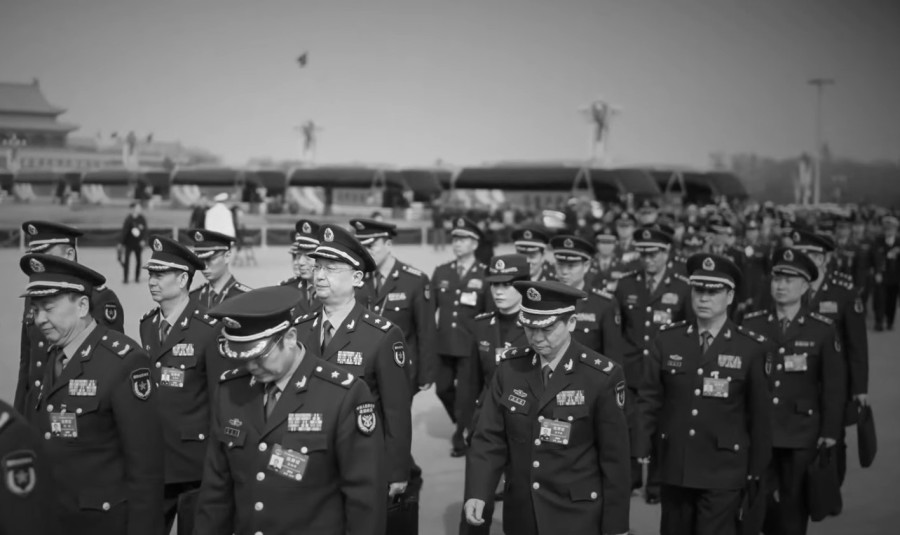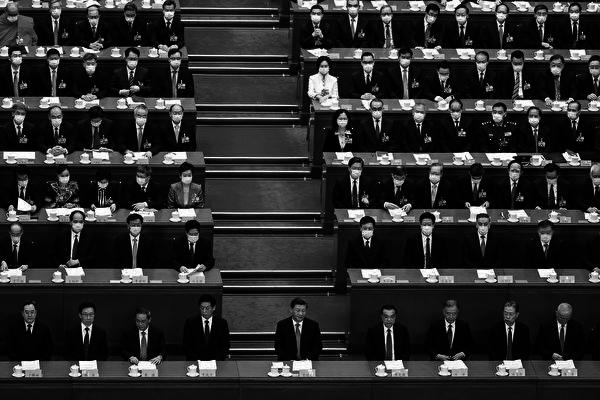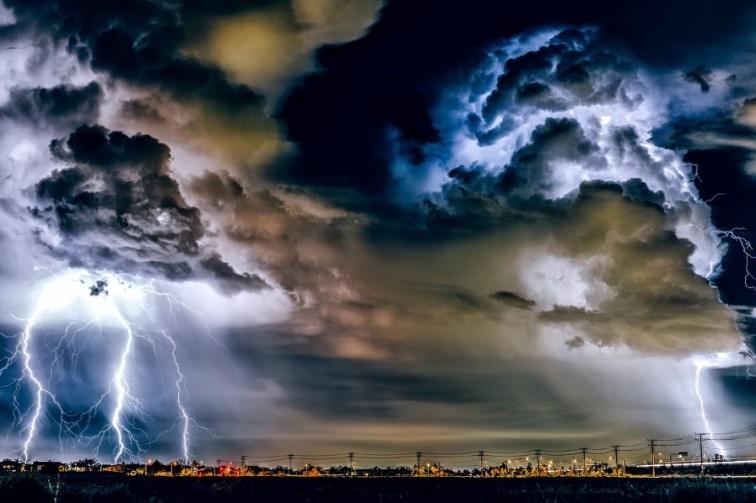The new prophecy mentions that Xi will face a rebellion from the military and local warlords. The image shows the representatives of the Chinese military attending the Two Sessions in Beijing. (Video screenshot)
[People News] Recently, the Central Military Commission of the Communist Party of China introduced new regulations aimed at comprehensively eliminating 'harmful influences,' which have garnered significant attention. The 'Military Report' emphasised the necessity of 'strengthening the unified leadership of the Party Committee and collective leadership.' Nakazawa Katsuji, a senior editor and editorial writer for the Nikkei in Tokyo, published an article indicating that there are increasing signs that 'collective leadership' is making a comeback within the Chinese Communist Party's military. He believes this trend has emerged after over a decade of power centralisation by Xi Jinping, the highest leader of the Communist Party, who has nearly abandoned traditional party practices.
The Central Military Commission recently issued 'Several Regulations on Vigorously Promoting Excellent Traditions, Completely Eliminating Toxic Influences, and Reshaping the Image and Authority of Political Cadres,' which requires political cadres to enhance their political loyalty.
At this juncture, General Miao Hua of the Communist Party's military was removed from his position as a member of the Central Military Commission less than a month ago.
These new regulations were introduced in the wake of a series of corruption scandals, with numerous senior military officers under investigation. However, no specific individuals have been publicly named as responsible for these 'harmful influences,' although external analyses suggest Miao Hua may be implicated.
On July 23, a commentator from the People's Liberation Army Daily published the second article in a series titled 'Adhering to Party Principles and Upholding Integrity and Character,' focusing on 'Firmly Establishing the Image and Authority of Political Cadres.'
The article appeared on the front page of the military newspaper that day. In its concluding paragraph, it stated, 'The more challenging and burdensome the tasks, the more necessary it is to strengthen the unified leadership of the Party Committee and collective leadership. We must lead by strictly implementing democratic centralism, ensuring that all work is placed under the unified leadership of the Party Committee, that all significant issues are studied and decided by the Party Committee, and that we enhance scientific decision-making and substantive oversight on major matters.'
Zhong Ze Ke Er remarked that this second article in the series may come as a surprise to many readers. He analysed that the dynamics within the Chinese Communist Party (CCP) military are subtly shifting towards a form of collective leadership that has not been seen for over a decade.
The author pointed out that we are currently in a politically sensitive period as the CCP's Beidaihe meeting approaches. Each year in early August, current high-ranking party officials and retired elders gather in Beidaihe for vacation and recuperation, engaging in informal discussions on significant topics.
He suggested that this period can be described as a 'scorching political summer.'
Zhong Ze Ke Er conducted a detailed analysis, noting that Xi Jinping has consistently been positioned as the 'core' of the Party Central Committee, and the term 'centralised and unified leadership of the Party Central Committee' has been a key political phrase used to reinforce and display his authority. However, the article employs the term 'unified leadership' while also referencing the Party's traditional decision-making mechanism of 'collective leadership.' Furthermore, it does not characterise 'unified leadership' as 'centralised.'
Zhong Ze Ke Er continues his analysis by stating that the article emphasises the need to "lead in strictly implementing democratic centralism," which is a fundamental organisational principle of the Communist Party of China (CPC). It further asserts that all activities must be "conducted under the unified leadership of the Party Committee," and all significant matters must be "collectively studied and decided by the Party Committee." The article also highlights the importance of "strengthening scientific decision-making and substantive deliberation" for major issues. Notably, there is no language suggesting a further concentration of decision-making power among Party Committee leaders.
Zhong Ze Ke Er interprets this article as a warning to Party Committee leaders against making arbitrary decisions. The CPC has consistently upheld the principle of absolute Party leadership over the military. He points out that the insights reflected in this article not only represent discussions within the military but also embody the internal deliberations of the Party Central Committee.
Additionally, the article references the political work conference of the entire military held in 2014 in Gutian, Fujian Province. Gutian is renowned for the Gutian Conference of 1929, which established the Party's absolute leadership over the Red Army, the predecessor of the People's Liberation Army (PLA).
Zhong Ze Ke Er questions what the term "Party Committee" in the article specifically refers to. Does it denote the Central Military Commission, or does it refer to other Party organisations or groups established within various military units? A broader question arises: will there be changes in the governance of the Central Military Commission and its subordinate bodies? If so, what changes can be expected?
The Central Military Commission of the CPC has traditionally operated under a system of "responsibility of the Chairman of the Military Commission," meaning that the ultimate decision-making authority over military affairs resides with the Chairman. The Central Military Commission is tasked with making decisions regarding specific military actions.
Zhong Ze Ke Er has suggested that any changes in governance methods could not only impact the security landscape in Asia but also have significant repercussions for global security.
At present, the composition of the Central Military Commission of the Communist Party of China has shifted dramatically from previous years. Following the conclusion of the 20th National Congress of the Communist Party of China in October 2022, the Central Military Commission originally had 7 members, but this number has now decreased to 4: Chairman Xi Jinping, Vice Chairman Zhang Youxia, Central Military Commission member and Chief of the Joint Staff Liu Zhenli, and Central Military Commission member and Secretary of the Discipline Inspection Commission Zhang Shengmin.
Former Minister of National Defence and Military Commission member Li Shangfu was purged in 2023, and his position within the Central Military Commission remains unfilled. His successor as Minister of National Defence, Dong Jun, is not a member of the Central Military Commission. Additionally, Miao Hua, the Director of the Political Work Department of the Central Military Commission, has also been purged; he was one of Xi Jinping's close confidants in the military. Another of Xi Jinping's trusted aides, Vice Chairman He Weidong, has been out of contact for nearly five months. He ranks just below Zhang Youxia within the military. △











News magazine bootstrap themes!
I like this themes, fast loading and look profesional
Thank you Carlos!
You're welcome!
Please support me with give positive rating!
Yes Sure!